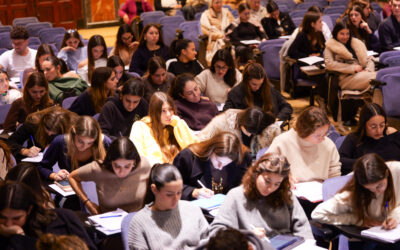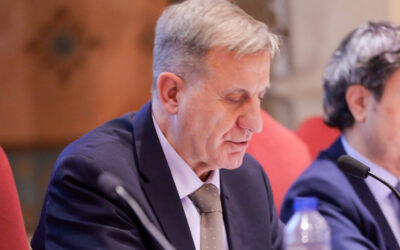The collection of poems Hablan de Ti las rosas (They Speak of You, The Roses), was praised for its technical mastery and the evocation of the divine in both daily life and in nature. Mr. José Gavinet Zarcos (Granada, Spain, 1942) received the XXXIII World Fernando Rielo Prize for Mystical Poetry during a solemn ceremony that was held on December 12th in the Auditorium of the Universidad Técnica Particular de Loja, in Quito (Ecuador), the host institution. This international event is held annually by the Fernando Rielo Foundation.
Mr. José Ganivet, a theologian, professor and poet, was sadly unable to attend the ceremony in person due to health problems. However, he participated in the event via video conference. He received a ‘Mention of Honor’ during the XXXII edition of the competition. On this particular occasion, his work was reviewed alongside eleven poets from Argentina, Bolivia, Colombia, Cuba, Spain, and the United States. He received the award for the fact that his collection of poems were written with aesthetic rigor and without reiterations, combining both sincerity and transparency. This put him on a par with some of Spain’s finest poets—composing verses such as “Searching for your semblance in my weariness; /in the inhumane clickety-click of machines” (unofficial translation). During this event, 264 poetic works were presented from the Americas, Africa and Europe. The winner of the Fernando Rielo prize is awarded 7,000 Euros and the opportunity to publish their work.
The Selection Committee was comprised of Dr. José María Sevillano (Spain), literary critic and President of the Committee; Dr. Nilo Palenzuela Borges (Spain), writer; Dr. Juan Valdano Morejón (Ecuador), writer; Dr. José Barbosa (Ecuador), literary critic; and Dr. Santiago Acosta (Ecuador), literary critic and secretary of the aforesaid committee.
In as far as the finalists’ works are concerned, the Judging Committee highlighted Gabriel Chávez (Bolivia) for his free-flowing, but casual style that combines Psalm-inspired verses with creative and powerful imagery. For his part, Hugo Rivella (Argentina) powerfully recreates Christ with a surrealist touch and a marked usage of hyperbole. On the other hand, Rafael Gómez’s (Colombia) poetry reflects intimate feelings–with echoes from the Orient: “I Clamor Unto Thee/ When I lose Myself/ in the Immensity of your Vastness” (Unofficial translation). Similarly, Fernando R. Matiussi (Argentina) invites us to become participants in his dialogues with God, which stem from his personal experiences of spiritual renewal and religious conversion.
Among the Spanish finalists, as well as the award winner, the judging committee underscored the aesthetic rigor of the nominees. For example, the carefully composed poetic meter of Jesús Martínez, combines simple verse structure with sonnets and the strophes; and Soledad Sánchez, who deftly writes sonnets combined with Haiku—echoing writers such as Lope de Vega, Machado and Aleixandre. Conversely, Lucrecio Serrano poetically describes the act of supplication and the Augustinian inquietum cor- with a compelling language that reflects Machadian reminisces. Indeed, many references were made to Machado by the nominees. In addition, other great poets were evoked in their work such as Celaya, Otero, and José Hierro. Similarly, the Judging Committee praised Maria Blanca Fernández for her excellent use of poetic rhythm and the expression “pain of absence”. Whereas, Fernando Jiménez emphasizes how we interiorize our inner nature from the child within, which is never abandoned, and the dialogue one has with the Lover of One’s Soul.
In as far as Marlon Guerra (Cuba) is concerned, his poetic work demonstrates a fervent love of God, which is based on strong, personal feelings. On the other hand, W.F. Lantry (USA) focuses the reader’s attention on the philosophical meaning of finding a path to God, which is often ridden with doubt or fear and a sense of void. For this reason, only grace can fill this purifying emptiness.
The poetry recital was held today, on the 12th of December, 2013, at 1900hours in the Main Auditorium of UTPL, in the Tenerife Towers, Quito. Also participating in the event were the UTPL chorus and the ARKOS Orchestra- performing a repertoire of Handel’s Messiah, and My Blessed Love by Luis Morales – the latter based on a text by Fernando Rielo and directed by the eminent musician’s Eblis Hidalgo (Ecuador) and Winfred Mitterer (Germany).
This award ceremony always takes place with the presence of a Committee of Honor, which is comprised of distinguished personalities from the cultural, university and religious world. On this occasion, it was presided by the Archbishop of Quito, Mons. Fausto Trávez. In addition, the event was attended by the following individuals: Mons. Julio Parrilla, Bishopric of Riobamba; Dr. Marcellino Oreja, President of the Royal Academy of Spanish, as well as the rectors from the following universities: the Universidad Pontificia de Salamanca; the Universidad de Comillas, CEU, the Universidad Autónoma de Madrid and the Universidad Técnica Particular de Loja, as well as numerous Spanish academics and poets.
It is noteworthy to mention that the Fernando Rielo Prize ceremony has also been held at the United Nations, UNESCO, the French Senate, and at city councils in Rome, Cologne and Madrid, as well as the Prado Museum, among other prestigious venues. Indeed, there has always been a vast participation of Latin Americans at this event. In 2012, the award was received by Ecuadorian Yhamile Narváez (Tulcan, 1972) with her work titled “Entre los pucheros” (Translated as “Among the pots and pans”).
In this year’s message, the President of the Prize, Jesus Fernandez Hernandez, stated that “mysticism is in itself already poetry because it creates, models, stylizes the experience of live through the inspired word: empowering word that includes and dialogues. It is so distant from the oppressive radius of ideologies, (…), and this is why mystical poetry is liberating.” In this sense, the objective of the Worldwide Prize is “to assist all poets of whatever creed or status to compose better poetry by simply showing us the way of the living water that quenches the thirst for the Absolute that all human persons have.”
Biographical data of José Ganivet Zarcos
José Ganivet Zarcos (Santa Fe, Granada), has a B.A. in Theology from the University of Salamanca and a diploma in Social Sciences from the University of Granada. He has dedicated all his professional life to teaching. He has collaborated to various works published by the Council of Education and Sciences (Three musical evenings with Federico García Lorca, 1998, included in the book published on the occasion of the centenary of his birth, and A Short History of Andalucia).
He won two poetry prizes of his university during his years as student; the literary prize of Montefrío (1974), and, more recently, the Prize «Laurel Notebooks» of the town of La Zubia (2004), for his book Resin and Onyx.
He published other books of poems: Weightless with the Dawn (2005), Time of Pruning (2006), Without a Homeland (2008), Let us Dream Poetry (2008), Of Talking with Me (2010), and Invocation to Joy (2011).
His book of poems Grant Me Silence (2012) was unanimously granted a special mention in the XXXIInd edition of the Fernando Rielo World Prize for Mystical Poetry, which took place in the Spanish Embassy to the Holy See.
He frequently collaborates to Granada’s daily Ideal and to the literary journal Entre Ríos.
He was selected for a number of anthologies in Spain and Europe and published poems in various journals in Spain and America.
Selection of the poems of the work The Roses Speak of You
The roses that bloom speak of you
The roses that bloom speak of you;
the geraniums hung on the wall;
the indecisive morning that takes flame
tangled in the rain and slows down;
the tick-tick of the clock that never sleeps;
the mediocrity wrapped in the sheet;
the taste of coffee: bitter, boiling;
golden oil and toast…
With your image I go to sleep, and I awake,
as said the verses my mother so often
recited for me when I was a child.
That, besides my rod and my staff,
your presence is the temple that gives me refuge
when the sun celebrates at my window.
Everything is Sacred
Everything is Sacred
Lord, everything is sacred
For one who knows how to see in
the innocent glance of a child
your innocence, your unfinished work;
your love, in a mother; your beauty,
in a painting, in a verse, in a poem…
Lord, everything is sacred
For one who knows how to see in
molecules, aflame, that form stars,
the hand that sustains
the whole Universe and completes it.
Lord, everything is sacred
for one who knows how to see you in
every sunset, every dawn.
for one who knows how to love you in the poverty
of the world’s poor, in their misery,
And awaits to be someday:
foam of your beach,
sand of your sand,
brook of your water,
sheaf of your time…
Luminous presence of your Presence!






